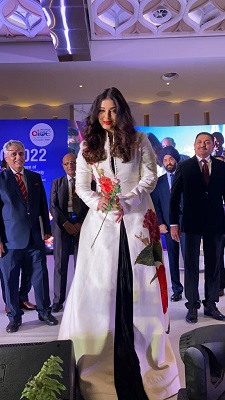The 80th Annual Conference of the All India Ophthalmological Society (AIOS), with nearly 24,000 member ophthalmologists, a society with a view to render service to the community through their profession, announced a landmark pledge to reduce preventable blindness in India to 50% by 2025. The cases of preventable blindness occur due to cataract, diabetic eye disease, vitamin A deficiency and trauma related blindness. India has the world’s largest population of the blind, it is estimated that the country has 12 million preventable blindness cases, who will become partially or fully blind, if not treated in time.
Ms. Aishwarya Rai Bachchan, inaugurating the 80th Annual Conference of the All India Ophthalmological Society
Dr. Lalit Verma, President (2022-23), AIOS, elaborated on the theme of the 80th Annual Conference of AIOS and said, “Preventable blindness must be addressed with a strong commitment as it impacts individuals’ quality of life directly and dramatically. It also impacts individual economic activity and consequently impacts the productive output of the entire country. Cataract in the aging can be solved with relative ease and timely eye examinations can help cure diabetic eye disease. Eye diseases due to vitamin A deficiency are also quite simple to solve. Our pledge to reduce preventable blindness to 50% by 2025 is going to be a national initiative with the active involvement of our members.”
Dr. Barun Kumar Nayak, President (2021-22), AIOS, added, “India has about one ophthalmologist for every 60,000 of our population, which puts a very heavy onus on our profession to take care of the population’s eye diseases. Ophthalmologists in India are among the best trained in the world and have been striving untiringly to put their profession to the best use of the citizens of India. We want government to encourage public-private partnerships in this endeavour to bring down preventable blindness. CSR funds of corporate must be allowed to be deployed for this very important social cause.”
Padmashree Dr. T.P. Lahane, Organizing Chairman, AIOC 2022, explained the process and averred, “The 80th Annual Conference of AIOS is a landmark occasion, undoubtedly the longest series of conferences by any medical association or society. In Maharashtra, we have successfully implemented programs for reducing preventable blindness by holding hundreds of eye camps held over the last three decades. We also create awareness on how to avoid injury to the eyes, each year we have been able to help over 7,00,000 people to come from darkness to light with the help of the government and NGOs. If we adopt the Maharashtra Model nationally, we will be able to bring down preventable blindness across the country significantly.”
Dr. Namrata Sharma, Honorary Secretary, AIOS, spoke on further expectations from the government, “Government must ban selling ‘chuna’ to children, as its mishandling can cause eye injuries even leading to blindness. Another major cause of blindness is in factories, and a compulsory inspection of workplaces is needed to see that protective eye wear is made available to every worker in situations where eye injuries are possible and to ensure safety standards are fully followed. Government led advertisement campaigns are needed urging diabetics to seek eye check-ups so that there is mass public awareness.”
About AIOS
The All India Ophthalmological Society (AIOS) was established in the year 1930. It is a registered society under the societies registration act of 1860. Membership of the society has continuously grown over the years and currently it has over 23,669 life members. The objectives of the society are cultivation and promotion of the study and practice of ophthalmic sciences, research and man-power development with a view to render service to the community and to promote social contacts among ophthalmologists of the country.
The society organises annual conferences in different parts of the country. In these conferences, a number of scientific activities that include instruction courses, symposia, lectures, post graduate refresher courses, booth lectures, wet labs, surgical skill transfer courses etc. are conducted for the promotion and mutual exchange of knowledge in the field of ophthalmic science. The society also gives incentives to the members in the form of awards, orations, prizes and Fellowships in recognition of their services in the various specialities.































